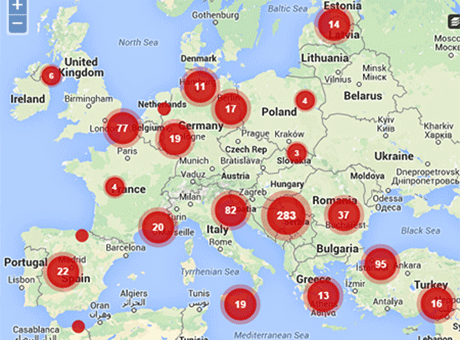Index relies entirely on the support of donors and readers to do its work.
Help us keep amplifying censored voices today.

(Illustration: Shutterstock)
Wrestling with his fear about Googling the composition of a carbon dioxide bomb after hearing of a failed bombing at LAX, Frankfurter Allgemeine Zeitung journalist, Peter Galison highlights one of the threats of mass surveillance to journalistic practice, “The knowledge that I might be walking into a security word search had been enough to make me hesitate.”
Following Edward Snowden’s leaks outlining the capabilities of intelligence agencies around the world to monitor, track and collate private online communications this moment of hesitation before tackling a story has become a major concern to journalists globally.
Pen International surveyed 772 fiction and non-fiction writers and found out that more than 1 in 3 writers in so-called free countries (34%) said they had avoided writing or speaking on a particular topic following the NSA revelations.
While Ryan Gallagher of The Intercept states “self-censorship is never the only available option” he acknowledges that his practices have changed:
“In the post-Snowden environment I definitely use encryption tools much more to communicate with people, mainly because more of my colleagues and contacts have now adopted these tools. It’s no longer a niche thing…the Snowden revelations were a big wake-up call for people.”
Encryption and anonymity software have emerged as the primary set of tools available to journalists to protect themselves, their stories and their sources. Indeed in the light of the leaked information, they have taken on added significance; the ability to depend on robust communication security may be the difference between coverage and self-censorship.
Jillian York, director for international freedom of expression at the Electronic Frontier Foundation outlines this central anxiety: “I’ve spoken to journalists who, upon realizing the extent of the NSA’s surveillance, have changed their practices. Some have adopted encryption…while others say they are afraid to cover certain topics.”
This tension between technical literacy and forms of self-censorship defines journalism in the mass surveillance age. As Cyrus Farivar of Ars Technica writes: “less tech-literate journalists may not even be aware of the threats that they may or may not face”.
The advent of blogging and social media, as well as the increase of citizen journalism around the world has enabled a diverse range of voices to join the debate around key issues but as Chris Frost, the chair of the ethics council at the National Union of Journalists (NUJ) states, this can expose many more people to the threat of mass surveillance: “Freelance journalists, citizen journalists and bloggers would need to be sure that they have the technical know-how to safeguard their sources and understand the potential risks involved.”

Index report: Europe’s journalists face growing climate of fear
Are key issues being avoided by those unable to guarantee total security in their communications? And if this is the case, what voices are being silenced?
This is not a threat for journalists alone. For Chris Frost and the NUJ, security and anonymity for sources is paramount: “Without the protection of sources, some people will refuse to speak to the media, for fear of being exposed.” As Ryan Gallagher says: “Quite simply, we don’t have a choice. We must protect our sources and we can’t do that if we don’t change the way we operate online.”
The ability of journalists to protect information from the state is also a vital step in protecting themselves when reporting in conflict zones. As Chris Frost writes, “if journalists are perceived as informers to the authorities, or as future witnesses in a trial, they can become a target.” Mass surveillance is a central tool for states to acquire and share information with its intelligence partners around the world. Implicating journalists as the source of the leak further endangers their safety and therefore their willingness to cover certain issues, as Ryan Gallagher articulates: “Some people may find it too daunting and just steer clear.”
The first principle on the International Federation of Journalists’ Declaration of Principles is “Respect for truth and for the right of the public to truth is the first duty of the journalist”, and this highlights the divergent interests of the state and the media. Where truth is withheld by the state, often in the name of “national security”, the role and responsibilities of journalists in informing the public is brought to the fore. Mass surveillance technologies are powerful tools for states to hinder and restrict this process, manipulating the media landscape to benefit their own aims and objectives at the expense of an informed and engaged civil society.
How journalists learn to navigate this landscape will determine their continued willingness and ability to report on sensitive issues, defending journalism in the public interest across the globe.
But, as Ryan Gallagher reminds us, this willingness is not easily defeated: “Thankfully there are a lot of courageous reporters in the world who will work to get out important information to the public no matter what. So fear will never be completely effective at shutting down media coverage.”
World Press Freedom Day 2015
• Media freedom in Europe needs action more than words
• Dunja Mijatović: The good fight must continue
• Mass surveillance: Journalists confront the moment of hesitation
• The women challenging Bosnia’s divided media
• World Press Freedom Day: Call to protect freedom of expression
This article was posted on 28 April 2015 at indexoncensorship.org
A few months after the adoption of a progressive new constitution guaranteeing freedom of expression and the right to privacy, reported plans by Egyptian authorities for indiscriminate mass surveillance of social media in Egypt have alarmed rights advocates and many within the country’s internet community.
The proposed surveillance plan has also sparked fears that internet activists may be the next targets of the military-backed government’s widening crackdown on dissent.
Defending his ministry’s decision to introduce the new mass monitoring system, Egypt’s Minister of Interior Mohamed Ibrahim was quoted by the semi-official Al Ahram newspaper on Monday as saying that the proposed system was “necessary to combat terrorism and protect national security”. He added it would be “similar to that used in the US or the UK to protect their national security”.
Seeking to allay concerns that the new system would curtail freedom of expression, Ibrahim said: “We do not seek to interfere with citizens’ privacy. The system will merely help us track and identify potential terrorist and criminal threats.”
Ibrahim’s statements came a day after the privately-owned Al Watan newspaper published a leaked call by the ministry of interior for tenders from companies to establish a sophisticated mass surveillance system.
In a statement criticising the proposed mass surveillance plan, Amnesty International said the monitoring of social media “would deal a devastating blow to the rights to privacy and freedom of expression in the country”, adding that “the new surveillance system risks becoming yet another instrument in the Egyptian government’s toolbox of state repression”. Amnesty also urged the Egyptian authorities not to replicate illegal programmes that have been used by other countries to violate the right to privacy. “Any surveillance programmes must comply with the general principles under international law of legality and judicial accountability,” the statement said.
Meanwhile, Egyptian rights groups and internet activists have expressed fears the proposed system would “close down the last remaining space for free expression in Egypt”.
Since the ouster of Islamist president Mohamed Morsi by military-backed protests last summer, the interim authorities have taken measures to tighten the state’s grip on the media. Days after the military takeover of the country, several Islamist-linked media outlets were shut down by the interim government. Security forces ransacked the offices of a Muslim Brotherhood TV channel and the Al Jazeera Mubasher Channel (accused by Egyptians of being pro-Muslim Brotherhood), confiscating their equipment and arresting their journalists.There has since been a marked shift in the tone of both state and state-influenced news media with many journalists now towing the government line either for fear of persecution or of being labelled “unpatriotic.” Several journalists have complained of “harassment” and intimidation” by security agencies. In today’s deeply polarised Egypt, reports of verbal and physical attacks by “patriotic” mobs on journalists trying to cover the conflict, are all too common.
Journalists covering “anti coup” protests have been deliberately targeted by security forces with no fewer than five being shot and killed while covering the unrest. Mayada Ashraf who worked for the privately-owned El Dostour newspaper became the latest journalist-victim of the violence when she was shot in the head in March while covering clashes between security forces and supporters of the ousted Morsi. Meanwhile, 65 journalists have been detained since the military takeover of the country nearly a year ago. There are 17 journalists currently behind bars in Egypt, according to a recent report released by the Committee for the Protection of Journalists. Three Al Jazeera English journalists have been in prison for six months, charged with “aiding a terror group and spreading false news that harms national security.” Despite pleading “not guilty”, their repeated requests to be released on bail have thus far been denied by the prosecutors in the case. A fourth Al Jazeera journalist has been in jail since August 2013 and has to date, not been charged.
Besides detecting any references to terrorism on social media, the controversial new system will also scan social networks for “calls for illegal protests and sit-ins, incitement to violence and defamation of religion,” Abdel Fattah Othman, a spokesman for the ministry of interior said in an interview broadcast Sunday on Al Mehwar Channel. In the absence of a “watch list” determining the topics the ministry intends to censor, many internet users are worried, fearing their electronic communications may be targeted.
Responses by Egyptian internet activists to the ministry’s surveillance plan have teetered between anger and sarcasm. Some Twitter users chose to take the matter lightly, mocking the decision in their tweets. #Wearebeingwatched — created by Twitter activists a week ago in response to the proposed plan — has fast become one of the top trending hashtags in Egypt with more than 50,000 uses within the span of a single week.
“State security agents when are you coming to get me?” Mahmoud El Zanaty a Twitter user jokingly asked, using the hashtag.”You never keep your appointments.”
“I’m free, that is why I’m being watched,” was another sarcastic message posted, by a user going by the twitter handle Doaa. Meanwhile, in a message addressed to the “agent” supposedly watching him, another twitter user wrote: “Farrag, come join me for tea!”
While most rights activists fear the proposed surveillance system may be used as a tool of repression, a few rights advocates have dismissed it as “mere government propaganda”.
“State security agencies have always kept a close watch on social media networks in Egypt,” Rights Lawyer Gamal Eid told Index. He cautioned however, that the ministry’s announcement was meant “to intimidate online activists and silence voices of dissent”.
Over the course of the past three years, several activists have been arrested and prosecuted for the content they have posted on social media networks. Blogger Maikel Nabil was arrested in March, 2011 and later sentenced to 3 years in prison for a Facebook post allegedly insulting the military. He had written: “The army and the people were never one hand.” He spent ten months behind bars before being released. In September 2012, Alber Saber, a Computer Science student and blogger was also arrested on allegations of having shared the YouTube trailer of the anti-Islam film “Innocence of Muslims” on his Facebook page. While police found no evidence that he had uploaded the video deemed insulting to Islam, he was nevertheless sentenced to 3 years in prison for “defaming Islam and Christianity” and allegedly “spreading atheism”. Saber was released for an appeal session a year later and subsequently fled the country. Earlier this year, Amr Hamzawy, a prominent liberal intellectual and political scientist was charged with “insulting the judiciary” for a Twitter post criticising a court ruling against three US pro-democracy civil society organisations .
Ahead of the January 2011 uprising, young pro-democracy activists had used social media networks to mobilise and organise the mass protests that brought down autocratic president Hosni Mubarak. Videos depicting police brutality and others urging Egyptians to rise against the corrupt Mubarak regime posted by the April 6 pro-democracy youth movement and “We Are All Khaled Said” — a Facebook page created by Google Executive Wael Ghoneim to bring attention to the brutal murder of a young Alexandrian (allegedly beaten to death by two police officers) — were the initial spark igniting the 2011 uprising, prompting some analysts to describe the revolt of 3 years ago, as a “Facebook Revolution”. Recognising the role of social media in the mass uprising, Mubarak cut off the internet and mobile phone lines in an attempt to quell the protests, a few days after their eruption. His rash response however, triggered public furore and only served to further strengthen the resolve of the Tahrir protesters.
With internet penetration in Egypt at 43 per cent (at the end of last year) — relatively low compared to other countries where illiteracy rates are lower than in Egypt — the Egyptian government is nevertheless wary of social media, having witnessed first-hand the role of Facebook and Twitter in toppling the authoritarian regimes in the region. Despite provisions in the recently-adopted constitution protecting the right to privacy and guaranteeing the confidentiality of electronic correspondence, telephone calls and other means of communication, the military-backed authorities are taking no chances. Systematic monitoring of Facebook, Twitter, You Tube and possibly mobile phone applications such as WhatsApp, Viber and Instagram would enable the government to identify dissenters and possibly, crackdown even harder on them, critics fear.
In the past year, the interim government has shown little respect for freedoms and rule of law. With military strongman Abdel Fattah El Sisi now sworn in as the country’s new president and in the wake of the proposed mass surveillance plan, skeptics warn that things are likely to get even worse as a counter-revolutionary bid seeking to obliterate all traces of the 2011 Revolution that called for bread, freedom and social justice, gains ground in Egypt.
This article was published on June 10, 2014 at indexoncensorship.org
Index on Censorship had a Google Hangout on how to protect yourself from mass surveillance, and what you can do to demand the right to privacy from your government.
Jim Killock, Executive Director at Open Rights Group, Mike Rispoli, Communications Manager at Privacy International, and Mike Harris, Campaign Director for Don’t Spy On Us share their thoughts on the unfolding fight to restrict mass surveillance.

(Illustration: Shutterstock)
Join Index on Censorship for a Google Hangout on how to protect yourself from mass surveillance, and what you can do to demand the right to privacy from your government.
On the panel, we have Jim Killock, Executive Director at Open Rights Group, Mike Rispoli, Communications Manager at Privacy International, and Mike Harris, Campaign Director for Don’t Spy On Us.
The event takes place on Friday 7 March at 4pm GMT. Follow the Hangout On Air here, and have your say on social media with the hashtag #DontSpyOnUS.